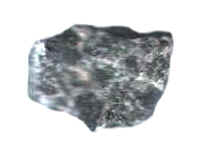|
AUGITE
|
 |
Augite is a member of the pyroxene group and may contain calcium, magnesium or iron. It is a silicate and is usually black or dark brown. It has a glassy sheen and obtains it's name from the Greek word auge which means brightness.
It may be found in volcanic and metamorphic rocks and has been located on the slopes of volcanoes such as Etna, Stromboli and Vesuvius. It has also been commonly found in meteorites and in rocks on the moon.
It is found in countries such as Finland, Germany, Italy and USA (California and Montana).

|
BARYTE
|
 |
Baryte is a sulphate of barium and is very heavy and soft (3.5 on the mohs scale). It may be colourless or white and gets it's name from the Greek word barys which means heavy.
It is not rare or hard enough to be classed as a gemstone but is the prime source of barium, which is used widely in industry (particularly for making paper and cloth).
Baryte forms in hydrothermals and can be found in sedimentary and igneous rocks and as a rock deposit from hot springs.
It may be found in Czech Republic, Germany, Italy and USA.
